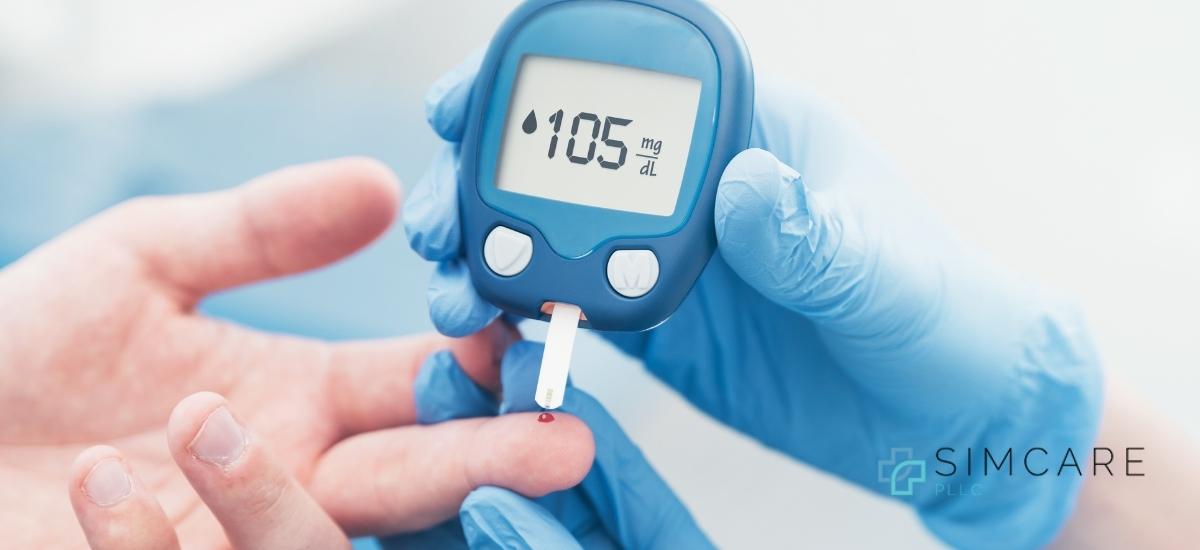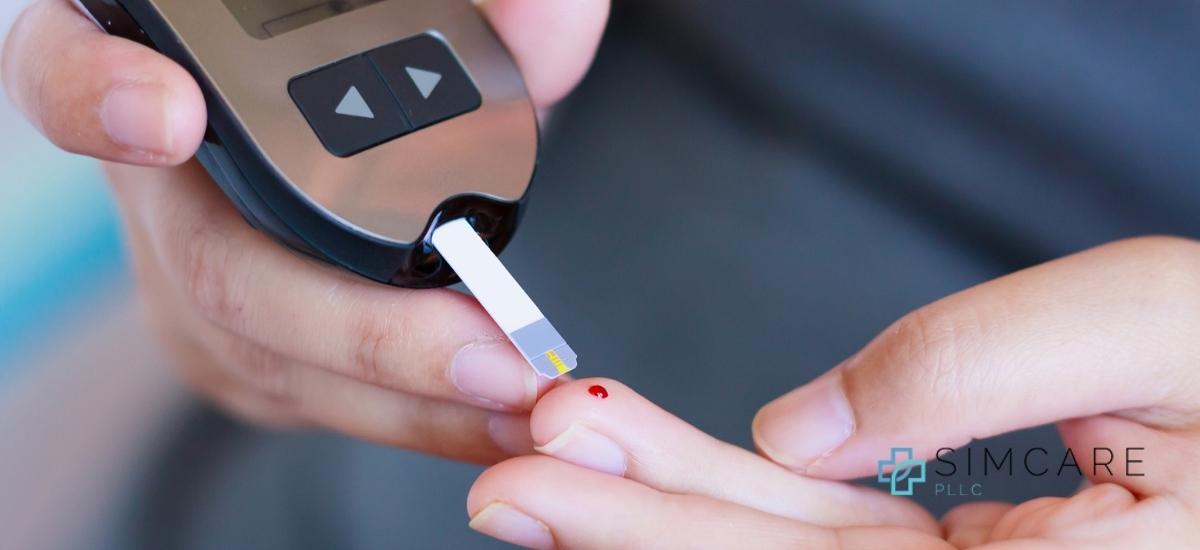Diabetes
Diabetes is a chronic medical condition characterized by high blood glucose levels resulting from the body’s inability to produce or effectively use insulin. It is a complex metabolic disorder that requires ongoing management to prevent complications and maintain overall health. In diabetes, the body either does not produce enough insulin (Type 1 diabetes) or does not properly use the insulin it produces (Type 2 diabetes). Insulin is a hormone that regulates blood sugar and allows cells to utilize glucose for energy. When insulin is not functioning properly, glucose builds up in the bloodstream, leading to hyperglycemia. Symptoms of diabetes can include frequent urination, excessive thirst, unexplained weight loss, fatigue, blurry vision, slow-healing wounds, and increased susceptibility to infections. However, some individuals with Type 2 diabetes may have no noticeable symptoms in the early stages.

Diabetes Management in Sugar Land and Pearland
SIMCARE PLLC, highly regarded for its proficient Diabetes Management in both Pearland and Sugar Land, boasts a seasoned internal medicine physician team. They dedicate themselves to delivering personalized care designed to manage this persistent ailment effectively. Scheduling an appointment is hassle-free, you can reach out online or dial us at (281) 491 1911 for Sugar Land and (281) 997 7333 for Pearland. Our Sugar Land facility can be found at 2225 Williams Trace Boulevard, Suite 110, Sugar Land, TX 77478, and our Pearland clinic is conveniently situated at 2425 County Rd 90, Pearland, TX 77584. Your path to better health can start with SIMCARE.
What is Diabetes Management?
Diabetes management refers to the comprehensive approach taken to effectively control and regulate blood sugar levels in individuals with diabetes. It involves a combination of strategies, interventions, and lifestyle modifications aimed at achieving optimal glucose control, preventing complications, and promoting overall health and well-being.
Blood glucose monitoring: Regular monitoring of blood sugar levels using a glucometer or continuous glucose monitoring system. This helps individuals track their blood sugar levels, identify patterns, and make informed decisions regarding medication, diet, and physical activity.
Medication or insulin therapy: Depending on the type of diabetes, individuals may require medication or insulin injections to help regulate blood sugar levels. These medications work to either increase insulin production or improve the body’s ability to use insulin effectively.
Healthy eating: Following a balanced diet that focuses on portion control, carbohydrate counting, and consuming a variety of nutrient-rich foods. This helps maintain stable blood sugar levels and promotes overall health. Dietary recommendations may be personalized based on individual needs and preferences.
Regular physical activity: Engaging in regular exercise or physical activity helps improve insulin sensitivity, lower blood sugar levels, manage weight, and enhance cardiovascular health. It is important to find activities that are enjoyable and sustainable for long-term adherence.
Weight management: Achieving and maintaining a healthy weight through a combination of a balanced diet and regular physical activity. Maintaining a healthy weight can help improve insulin sensitivity and promote better blood sugar control.
Education and self-management: Acquiring knowledge about diabetes, its management, and practical skills for self-care. This includes understanding how to monitor blood sugar levels, administer medications or insulin, recognize and manage symptoms of hypo- or hyperglycemia, and make informed decisions regarding lifestyle choices.
Regular healthcare check-ups: Scheduling routine visits with healthcare professionals who specialize in diabetes care. These visits allow for monitoring of blood sugar control, assessment of overall health, adjustment of treatment plans as needed, and addressing any concerns or questions.
Effective diabetes management requires ongoing commitment, self-care, and collaboration between individuals with diabetes and their healthcare team. It is important to maintain open communication, seek support when needed, and stay proactive in managing the condition. With proper management, individuals with diabetes can lead fulfilling lives while minimizing the risk of complications associated with the condition.

When Diabetes Management is Required?
Diabetes management is required when an individual is diagnosed with diabetes. It is essential to manage diabetes effectively to achieve and maintain optimal blood sugar control, prevent complications, and promote overall health and well-being. Treatment for diabetes typically involves a combination of lifestyle modifications, medication or insulin therapy, regular monitoring of blood sugar levels, and ongoing healthcare support. The specific management approach may vary depending on the type of diabetes, individual needs, and healthcare professional’s recommendations.
Regular diabetes management is necessary to keep blood sugar levels within the target range, as uncontrolled diabetes can lead to various complications, including cardiovascular disease, nerve damage, kidney problems, and eye complications. By actively managing diabetes, individuals can minimize the risk of these complications and maintain a better quality of life.
Diabetes management is a lifelong commitment, requiring individuals to monitor their blood sugar levels, make healthy dietary choices, engage in regular physical activity, take prescribed medications or insulin as directed, and attend regular healthcare check-ups. Adhering to the recommended management plan and seeking prompt medical attention when needed are crucial to effectively control diabetes and prevent long-term complications.
STD ( sexually transmitted disease ) Care by Pearland’s Doctor in SIMCARE PLLC
At SIMCARE PLLC, we provide comprehensive care for individuals with diabetes, helping them effectively manage their condition and improve their overall well-being. Our specialized diabetes management services aim to achieve optimal blood sugar control, prevent complications, and support a healthy lifestyle.
Our approach to diabetes management includes personalized treatment plans tailored to each patient’s unique needs and goals. Our experienced healthcare professionals collaborate closely with individuals to develop strategies that encompass various aspects of diabetes care.
Blood sugar monitoring: We guide patients in monitoring their blood sugar levels regularly using advanced monitoring technologies and provide education on interpreting and managing their results.
Medication management: Our healthcare team offers expert guidance on the use of oral medications or insulin therapy to help regulate blood sugar levels effectively. We ensure patients understand the importance of adhering to their prescribed treatment regimen.
Nutritional counseling: We provide personalized dietary recommendations and education on carbohydrate counting, portion control, and healthy eating habits. Our goal is to help patients make informed choices that support stable blood sugar levels and overall well-being.
Exercise and lifestyle guidance: We assist patients in developing tailored exercise plans and provide guidance on incorporating physical activity into their daily routine. Regular exercise can help improve insulin sensitivity, manage weight, and enhance cardiovascular health.
Diabetes education and support: We offer comprehensive education on diabetes self-management, including skills for monitoring blood sugar, administering medications or insulin, recognizing and managing symptoms of hypo- or hyperglycemia, and navigating lifestyle challenges.
Regular follow-up and monitoring: We schedule routine check-ups to monitor progress, adjust treatment plans as needed, and provide ongoing support. Our healthcare professionals are dedicated to helping patients stay on track and achieve their diabetes management goals.
At SIMCARE PLLC, we prioritize patient-centered care and strive to empower individuals with the knowledge and tools they need to successfully manage their diabetes. If you have diabetes or suspect you may have the condition, we encourage you to reach out for professional help. Our dedicated team is here to support you on your journey to better diabetes management and improved overall health.
Latest Blogs & News
How can Diabetes affect Women? Symptoms & Treatment
Over 199 million women today have diabetes, and by 20401, that number is expected to rise to 313 million. With...
High Blood Pressure in Women- Is it too Risky?
Blood pushing against the inner lining of arteries creates blood pressure. When that force rises and remains...
Sugarland family practice for primary care and chronic disease management
Family practice is a type of primary care that provides medical care to patients of all ages, from infants to...



